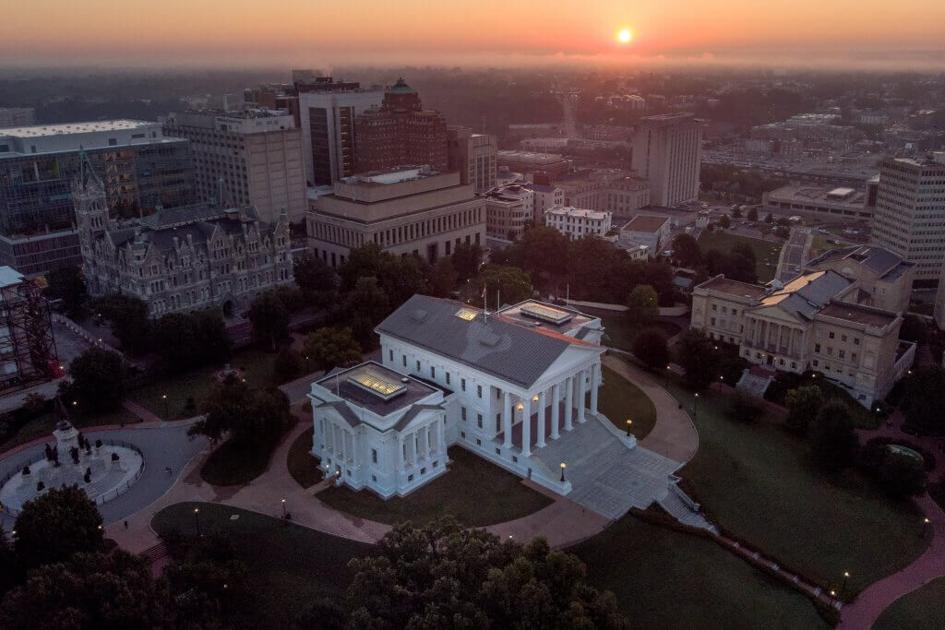
The most revealing moment of the Virginia Redistricting Commission’s meeting Tuesday may have come during a bathroom break.
With microphones still on and broadcasting to a live stream, Sen. George Barker, D-Fairfax, huddled with Democratic citizen commissioner Brandon Hutchins, who seemed concerned the commission was setting itself up for public blowback by not living up to its promise of a fairer redistricting process.
“They are going to bomb us for this,” Hutchins said.
“Actually, they won’t,” said Barker. “It’s actually a fairly small segment of the public that is working on this issue. … There’ll be some complaints here and there. There always are.”
Time will tell whose prediction is correct. But a series of decisions the commission made Tuesday offer the clearest picture yet of the role politics will continue to play in a process formerly handled entirely by legislators in the General Assembly who were effectively empowered to draw their own districts.
In a divided vote, the 16-member commission, made up of eight legislators and eight citizens, chose to allow political data and incumbents’ home addresses to be considered throughout the map-drawing process. Supporters said that would allow the commission to spot and correct potential problems with minority representation or undue partisan leanings. Critics said it would feed the perception districts are being “rigged” to achieve a particular outcome.
On a party-line vote, the commission deadlocked on a proposal to hire a team of geographic data specialists from the University of Richmond who would have assisted the commission with the technical side of drawing maps. Commissioners, who had already decided to hire both Republican and Democratic attorneys as legal counsel, got conflicting advice from the lawyers on whether turning to academia was a good idea. A Democratic lawyer said he saw no problem with it, but Republican attorneys said the UR group lacked redistricting experience and could be perceived as biased.
It was unclear how the commission would proceed with hiring outside map-drawing help, but one possibility is the partisan lawyers will select their own partisan map-drawers. The question of whether those two partisan teams would be creating their own maps or working together on a single proposal was left unresolved.
“We just made our lives a lot more complicated,” said Democrat Greta Harris, a commission co-chair who said the UR group’s geographic information systems skills would translate to redistricting even though the team hadn’t done it before.
Republican commissioners said the lawyers had been asked to try to reach a bipartisan consensus on experienced map-drawers. Because they weren’t successful, they said, they couldn’t support the hire.
Republican commissioner Richard Harrell used an analogy from his trucking business to explain his reasoning, saying he wouldn’t ask an inexperienced driver to haul hazardous chemicals.
“Because he’s got to be trained. And it’s dangerous,” Harrell said.
A similar partisan split emerged when the commission decided whether it should form eight-person subcommittees to work on House of Delegates and Senate maps before taking them to the full commission.
The group’s bipartisan co-chairs had proposed equalized subcommittees with both parties, both citizens and legislators, and legislators from both chambers serving on each subcommittee. Some commissioners, particularly Sen. Steve Newman, R-Lynchburg, argued all senators should serve on the Senate subcommittee and all House members should serve on the House subcommittee. That approach, he said, would help the commission produce maps capable of passing the two chambers when they go to the General Assembly for an up-or-down vote.
Republican commissioner Virginia Trost-Thornton concurred.
“When I’m seeking medical expertise I go to a medical expert,” Trost-Thornton said. “If I’m on the House committee, I would be seeking House members’ expertise in trying to draw their lines.”
Citizens looking to legislators for guidance on what to do, said Democratic commissioner James Abrenio, defeats the purpose of a citizen-led commission.
“I don’t think the public wanted us to just defer to the legislators,” he said.
Mackenzie Babichenko, the commission’s Republican co-chair who helped craft the subcommittee proposal, voted with the body’s Democrats in an unsuccessful effort to have subcommittees with mixed representation from the two chambers. The only purpose, she said, was to “divide up the work.”
“In no way were these groups meant to supplant the will and the wishes of the full commission,” Babichenko said.
The failed vote means there will be no subcommittees.
“I hope everybody likes being in Richmond,” Harris said.
The commission has not yet begun drawing maps, but the body is planning to meet on a weekly basis going forward.
Under its timeline, new legislative maps are due Oct. 10. New congressional maps are due Oct. 25.
"allow" - Google News
August 18, 2021 at 09:21PM
https://ift.tt/3suw6qz
Va. Redistricting Commission votes to allow use of political data, reject university map-drawers - Fauquier Times
"allow" - Google News
https://ift.tt/2KTEV8j
https://ift.tt/2Wp5bNh
Bagikan Berita Ini















0 Response to "Va. Redistricting Commission votes to allow use of political data, reject university map-drawers - Fauquier Times"
Post a Comment